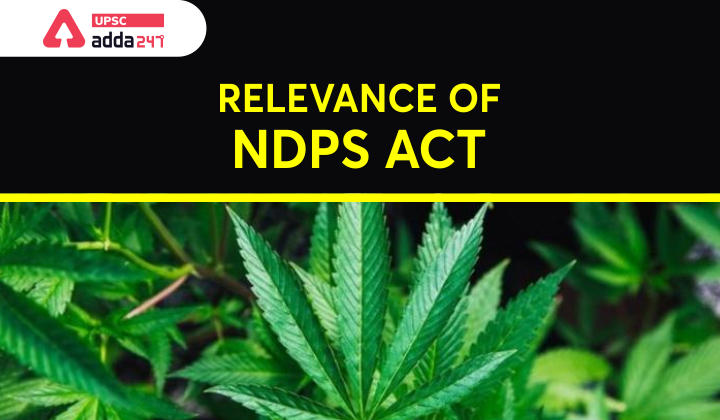GS Paper – 2: Government Policies & Interventions
Context:
The Union Ministry of Social Justice and Empowerment has proposed certain changes to some provisions of the Narcotic Drugs and Psychotropic Substances (NDPS) Act of 1985.
Background:
The Act was promulgated with the definite intent to terrorise those involved in any manner with the illicit drug market, be it as a user, buyer, seller, peddler or an agent, but has not succeeded in even making a visible dent in the illicit drug empire. The recent recommendations of the ministry have assumed importance in the backdrop of some high-profile drug cases.
Important Provisions of the NDPS Act:
- The Act is a prohibitionist law.
- Essentially, it contains two categories of offences: (1) trafficking and (2) consumption.
- Section 8 prohibits the cultivation of opium, poppy, cannabis plant and coca plant and the production, manufacture, possession, selling, purchasing, transport, warehousing, consumption, financing illicit traffic, harbouring offenders, and import and export of any narcotic drug or psychotropic substance except for medical and scientific purposes as specified by the government.
- A convicted person shall be punished with rigorous imprisonment for a term of not less than 10 years which may extend to 20 years and a minimum fine of Rs one lakh which may extend to Rs 2 lakh or more (sections 15-25 and sections 27A-29).
- Offences relating to cannabis are punishable with a minimum sentence of five years and a fine that may extend to Rs 50,000 (section 20).
- Far greater punishment has been imposed for a repeat offence.
- The amendment in 1989, section 31A laid down the death penalty for second offences with regard to certain drugs if the quantity involved exceeded specified limits.
- Section 35 presumes that an accused under this Act had the intent, motive and knowledge of and for his actions.
- Section 54 goes a step further to add that unless the contrary is proved it shall be presumed that the accused was in possession of the illicit articles seized from him.
- Chapter V of the Act pays attention to the procedure of investigation to be followed for the offences herein.
Flaws in the NDPS Act:
- Securing conviction for the accused in drugs cases is an arduous task.
- There are frequent delays in court procedures.
- Failure of the investigating agencies to present prosecution cases according to the procedure set by the NDPS Act.
- Weak bail laws afford bail to the rich while keeping the poor in prison.
- No distinction between the drug peddler and the end-user.
- The Act as of now prescribes jail for everyone — the end-
- user and the drug supplier.
- poor understanding of the addiction problem.
Ministry’s Recommendations:
- One of the recommendations of the Ministry is to decriminalise the possession of narcotic drugs in smaller quantities for personal purposes.
- Another suggestion is that persons using drugs in smaller quantities be treated as victims.
- To refer persons possessing drugs in smaller quantities to government-run rehabilitation centres instead of awarding them jail terms and imposing fines.
The practicality of the Ministry’s proposals:

- The proposal to send persons to rehabilitation centres is good on paper but do we have the infrastructure to ensure that it is properly implemented? The answer is ‘no’.
- We don’t have adequate de-addiction centre counsellors.
- We face an acute shortage of psychiatrists and counsellors.
Best practices in the world-Case Study of Iceland:
In Iceland, for example, a community-led approach has worked wonders. Iceland witnessed acute drug abuse among its children and youth. The government decided to tackle the issue right from the school level. From introducing aptitude tests which revealed the inclinations of students to persuading parents to keep liquor and cigarettes out of reach of the youth, the country took various measures to tackle the problem and weaned away 70-80% of its young population from drugs. It also helped drastically reduce the usage of drugs.
What should be done?
- We need to thoroughly examine why and how people are getting addicted to narcotic drugs. There is growing hopelessness in society due to various factors. The COVID-19 pandemic, for instance, has aggravated anxieties among the youth.
- We need to redefine and redesign the law so as to tackle what acts as a trigger.
- An aspect of the Act which is least discussed is a national fund for rehabilitation. We need to allocate more money for the fund, help transform drug addicts and make the job of policing easier.
- Our approach to tackling the problem should begin from home.
- Teachers should keep an eye on school surroundings to ascertain whether anyone is selling hookah pipes or ganja papers.
- Checking drugs usage is not the job of only the police. Everyone should have a proactive role.
- Civil society support is equally important. If everyone joins hands, wiping out drugs usage is not an issue at all.
- Before amending the NDPS Act, States be consulted. it would be better to introduce this on a pilot basis in one State that faces an acute drug-related problem.
Conclusion:
Given the provisions of the Act and the manner in which they are used, many of the accused end up in jails, even as undertrials. It is, therefore, crucial that we review our basic premises and reform this Act. Moreover, Civil society and governments will have to work together to create an enabling environment to address the issue.



 TSPSC Group 1 Question Paper 2024, Downl...
TSPSC Group 1 Question Paper 2024, Downl...
 TSPSC Group 1 Answer key 2024 Out, Downl...
TSPSC Group 1 Answer key 2024 Out, Downl...
 UPSC Prelims 2024 Question Paper, Downlo...
UPSC Prelims 2024 Question Paper, Downlo...




